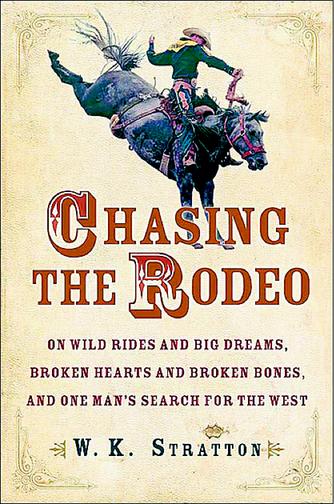W.K. Stratton's Chasing the Rodeo makes the sport seem familiar even if it defies easy categorization. A native Oklahoman, Stratton's love for bronc- and bull-riding is practically a birthright—his biological father was a rodeo bum (with the emphasis on bum) and his mother a certified cowgirl. Chasing is both a memoir, a string of profiles and a travel narrative with lengthy digressions into rodeo culture and folklore.
One of Chasing's great strengths comes in its unearthing of historical nuggets. Who knew, for example, that an African-American cowboy named Bill Pickett single-handedly invented bulldogging—otherwise known as steer wrestling—and went on to become one of the sport's first superstars. Sadly, this didn't protect him from the dehumanization of Jim Crow, which consigned him to sleep with the livestock while traveling by train. By way of compliments, his fellow cowboys bestowed such gems as, “Bill's hide was black, but his heart was white.”
Ultimately, what Stratton seems to be chasing is an authentic American ritual that takes the stuff of hard work and transforms it into a celebration of hard play. As such, he attempts to settle the thorny debate of where the rodeo originated. While often described as “the only spectator sport originating entirely in the United States,” Stratton contends that like many American products, rodeo is a Mexican creation, one that predates the cowboy era by several centuries. Stratton fears that the rush to position rodeo as the next NASCAR—a breakout sport that's both a brand and a demographic—will strip the sport of its soul. At the same time, however, he notes that the corporate logo cowboy can make a great living. Clearly, however, he prefers Oregon's Pendleton Roundup, where jumbotrons and advertising are verboten.
For all his detailed reporting, it's Stratton's personal reflections that make the book compelling. As he's chasing the rodeo zeitgeist, he is also chasing the ghost of his biological father, “Cowboy Don.” While this quest is less than glorious, rodeo is one of the few links Stratton has to his dad, who left his mom when he was an infant. A prodigious drinker and ladies' man, he was never much of a rodeo star and eventually wound up punching a clock as a construction worker. After a string of failed marriages and relationships, he died broke and alone. While Stratton doesn't advance such an argument, it's hard to deny the connection between “chasing the rodeo” and his larger voyage in search of paternal communion.
Stratton may not satisfy hardcore fans, although they will certainly benefit from his painstaking historical research. While there's an undue amount of banal narratives involving Stratton's rental cars, motel and press box experiences, there's enough in this journey to make it worth the trouble of saddling up and following along.









